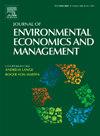Input subsidies and the depletion of natural capital: Chinese distant water fishing
IF 5.9
3区 经济学
Q1 BUSINESS
Journal of Environmental Economics and Management
Pub Date : 2025-02-06
DOI:10.1016/j.jeem.2025.103127
引用次数: 0
Abstract
Input subsidies in natural resource sectors are widely believed to deplete the natural capital on which these sectors depend. However, estimating the causal effect of subsidies on resource extraction has been stymied by identification and data challenges. China’s fishing fleet is the world’s largest, and in 2016 the government changed its fuel subsidy policy for distant water vessels to one that increases with predetermined vessel characteristics. Regression discontinuity estimates imply a long-run equilibrium elasticity of fishing hours with respect to fuel subsidies of 2.2, though these estimates exhibit only modest precision according to randomization inference. Back-of-the-envelope calculations suggest that reducing Chinese distant water fuel subsidies by 50% could increase fish stocks across ocean regions by a median of 5.5%.
投入补贴与自然资本枯竭:中国远洋渔业
人们普遍认为,自然资源部门的投入补贴耗尽了这些部门所依赖的自然资本。然而,估计补贴对资源开采的因果影响一直受到识别和数据挑战的阻碍。中国的渔船队是世界上最大的,2016年,政府改变了对远洋船只的燃料补贴政策,改为根据预定的船只特性增加补贴。回归不连续估计意味着捕鱼时间相对于燃料补贴的长期平衡弹性为2.2,尽管根据随机化推断,这些估计仅显示出适度的精度。粗略计算表明,如果中国将远洋燃料补贴减少50%,整个海洋地区的鱼类资源将增加5.5%。
本文章由计算机程序翻译,如有差异,请以英文原文为准。
求助全文
约1分钟内获得全文
求助全文
来源期刊
CiteScore
8.00
自引率
4.30%
发文量
91
期刊介绍:
The Journal of Environmental Economics and Management publishes theoretical and empirical papers devoted to specific natural resources and environmental issues. For consideration, papers should (1) contain a substantial element embodying the linkage between economic systems and environmental and natural resources systems or (2) be of substantial importance in understanding the management and/or social control of the economy in its relations with the natural environment. Although the general orientation of the journal is toward economics, interdisciplinary papers by researchers in other fields of interest to resource and environmental economists will be welcomed.

 求助内容:
求助内容: 应助结果提醒方式:
应助结果提醒方式:


